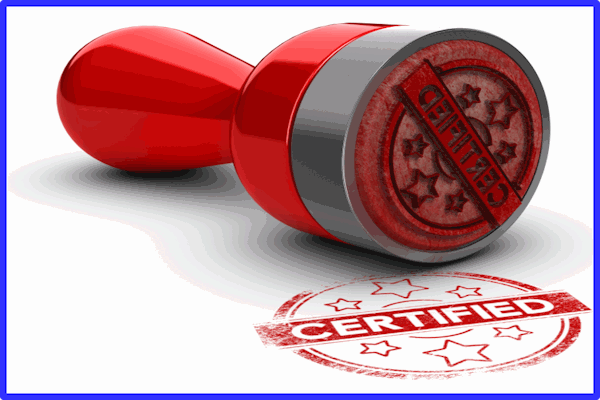By Thom Mandl, Guest Contributor
Certifications Demonstrate Expertise
Professional certifications can cost hundreds and sometimes even thousands of dollars. Perhaps even more importantly, they often require a significant investment of time and energy – both of which are in short supply for busy professionals. What are the reasons for making such an investment in a professional certification?
As both an employer and job seeker, I am convinced the right certifications play an important role in hiring, promotion, and ultimately performance.
Professional certifications demonstrate expertise and are one of the best credentials you can obtain. They testify to proficiency in a particular skill or field, which can make you a more attractive candidate, enable superior job performance, and lead to career advancement.
The top reasons for earning a professional certification are:
- Knowledge Validation
- Competitive Advantage
- Career Advancement
- Compensation Enhancement
- Community Enrichment
Let’s look closer at each reason:

“$2.133 Trillion is spent annually in the U.S. on the delivery and attainment of credentials.”
– Credential Registry
1. Knowledge Validation
Earning a certification indicates you have met specific standards and possess a certain level of knowledge and skills. It provides third-party validation of your abilities, which can be valuable when applying for jobs.
For example, some organizations require certification in Lean, Supply Chain Management, or Project Management to weed out candidates who have simply picked up a few buzzwords, but do not understand the improvement methodology and could not effectively lead a project.
Someone without a lean certification may claim to “know” lean, when in reality, they don’t know the 5 principles of lean, how to run a kaizen blitz event, or create a value stream map. All are key skills and knowledge required at organizations making a lean transformation.
Third-party validation of skills from a professional certification is far more powerful than self-promotion and helps mitigate risk for employers.

“Earning certifications is generally useful and recommended as many employers will view them as a sign of commitment to your profession at the very least.”
– Columbia Southern University
2. Competitive Advantage
Certifications give you an edge over other candidates who do not possess them. They showcase your commitment to continuous learning and professional development. Certifications also reduce the risk associated with hiring for a particular skill, since it can be difficult to determine a candidate’s level of competency during the interview process.
As an employer, I look for people who have demonstrated they are lifelong learners and who will continue to grow their knowledge and skills to meet the evolving needs of the company.
Many universities provide the opportunity for students to earn a degree and professional certifications at the same time. The award winning MBA in Project Management program at Louisiana State University Shreveport offers Certified Lean Practitioner as part of a Lean Transformation class and Certified Six Sigma Green Belt as part of a Process Improvement class. Having a degree and professional certifications is a competitive advantage.
For those without college degrees, research from the Burning Glass Institute reveals a number of organizations are reacting to worker shortages by dropping college degree requirements for many middle-skill jobs. These employers are “evaluating applicants on their demonstrated skills and aptitudes, rather than on their level of academic attainment…” They go on to estimate “1.4 million jobs could open up to workers without college degrees over the next five years.” A professional certification can go a long way toward showing the documented skills which these employers will be looking for.

“A certificate easily moves you at least a thousand rows ahead of other job candidates, with similar knowledge.”
– Wasay Syed
3. Career Advancement
Many organizations consider certifications when making decisions about promotions and career advancement. Certifications demonstrate expertise, open new opportunities, and allow you to take on more significant responsibilities.
For example, as part of the Lean Transformation at one company, one of my engineers who had earned the Certified Lean Practitioner designation was promoted to an Operations Excellence role.
If an organization is committed to lean, six sigma, agile, sustainability, or any other worthwhile endeavor, then earning a relevant certification demonstrates expertise and signals you are all-in. You will demonstrate you have current skills and knowledge for the tasks at-hand.
Don’t sit back and wait for something to happen. Promotions go to those who rush in and announce they are ready to take action.

“Tomorrow brings new challenges and we must continually upgrade our credentials if we are to progress in our careers.”
– Mike Sheahan, President Emeritus, ISCEA International Standards Board
4. Compensation Enhancement
Certifications can positively impact your earning potential. Some employers offer higher salaries to employees who hold relevant certifications due to their increased expertise and value to the organization. Data from the United States Department of Labor reveals those with a certification in “management, business, and financial operations” jobs make 31% more than those without a certification.
In one of the companies I led, an employee took the initiative to earn a Certificate in International Trade to meet the growing export needs of our business. This achievement led to his promotion and a substantial wage increase.
Higher salaries are also a function of demand and supply. If a job requires a certification, then there will be fewer people who meet the requirements. Data from the United States Department of Labor reveals only 2.4% of full time workers in the civilian labor force have a professional certification. For many skills, the demand is high and the supply is low.

“Certified individuals earn up to 25% more than their non-certified peers.”
– Association for Supply Chain Management
5. Community Enrichment
Pursuing and maintaining certifications often involves engaging with a community of professionals in your field. This can provide you with valuable networking opportunities and access to industry events, where you can keep current with emerging trends. The best and most engaged people will be collaborating at conferences and similar community events. This collaboration drives new and better ways into the DNA of the body of knowledge associated with the certification.
Belonging to a community is a two-way street. While you sharpen your skills and pick up new ideas, you will also be giving back. Sharing your successes and challenges is just as rewarding as learning from others.
As an example, the certification I earned in supply chain management led to an invitation to join the Board of Directors of the Association for Supply Chain Management Northern Colorado. Beyond the benefits of taking a leadership role for a non-profit professional organization, I also made many long-term friendships.

“It is everyone’s obligation to put back into the world at least the equivalent of what you take out of it.”
– Albert Einstein
Summary
Make no mistake. Professional certifications demonstrate expertise and are one of the best credentials you can obtain.
They demonstrate you are a serious professional who has invested in acquiring the skills and knowledge required to help any organization succeed.
In addition, earning a high quality professional certification will give you a competitive advantage over those who cannot demonstrate they take continuous education seriously. You will find the doors open for career advancement and higher compensation.
You will feel great about yourself, rewarded for your hard work, and find yourself in a community of like-minded professionals.
Be in the 2.4% of workers with a certification.

About Thom Mandl

Thom Mandl is an operations executive with over 25 years of experience in manufacturing with early career experience at two global market leaders, Ford and Procter & Gamble, where he gained valuable experience and skills that he continues to successfully apply at smaller manufacturers in a wide variety of industries.
Thom has built a record of success in elevating companies to the next level by creating a high-performing culture while implementing best practices in strategy, business development, supply chain, and operations. He holds an engineering degree and MBA, and has earned professional certifications in Lean, Six Sigma, and Supply Chain Management.
See: LinkedIn profile
Six Sigma Belts
Lean Education Standards
Professional Certifications
What is the Credential Registry?
Top Benefits of Lean Certification
Subscribe to our newsletter
References for Reasons to Earn a Professional Certification
Counting Credentials by the Credential Registry
The Emerging Degree Reset from the Burning Glass Institute
Labor Force Statistics from the United States Department of Labor
Organizational Improvement Acronyms by Transformance Advisors
Certifications and Credentials by the Association for Supply Chain Management
How Important Are Professional Certifications? by Columbia Southern University
